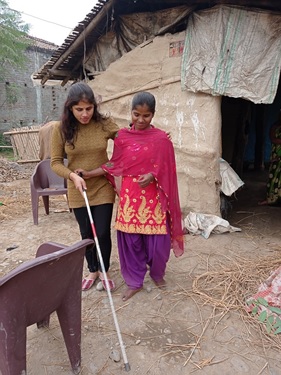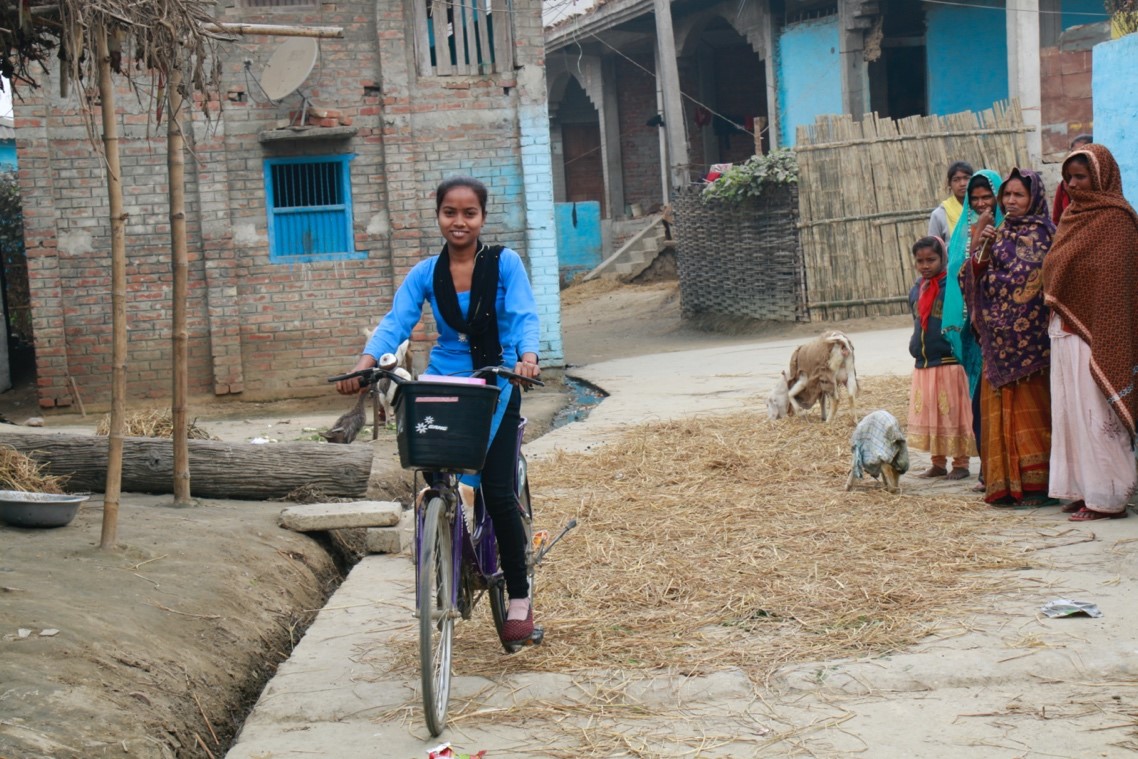“It’s important to me that these girls have equal rights and opportunities.” – Anju Dhital, volunteer in Nepal

Volunteering on the ENGAGE project in rural Nepal, Anju Dhital, 30, helps children with visual impairments access quality education opportunities, by mentoring young people, training local facilitators in braille, and motivating parents and community volunteers to support children with disabilities. Anju, a national volunteer based in Terai, was awarded the Education Award in the VSO Volunteer Impact Awards 2020.
As a visually impaired girl, growing up I was fortunate to have the support of my family. However, going to school I faced many challenges. The learning environment was not disabled-friendly and I had no appropriate learning materials. For example, trying to learn about the different shapes in geometry with only a book and no braille pictures meant I got poor marks in maths growing up. I could only start school at 7, while most children start at 5, so I ended up in reading classes with younger children. Because we were older and taller, those with disabilities were sat at the back of the class and couldn’t hear the teacher. The teacher would often write on the board, without saying what they were writing.
Coming from this background, I felt inspired to work closely with children who have disabilities, who are based in rural areas. I understand the challenges of those with disabilities. At the age of 22, I started volunteering to support people with disabilities. In this role I needed to use local transport to get about but often wouldn’t be allowed to enter the bus. The person on the bus would assume I couldn’t pay, simply because of my disability.
As a VSO volunteer, I work with parents to convince them to send their children to school. My purpose is to empower girls with disabilities and support their education. I directly support four girls and one boy to learn braille, then there are 50 children with disabilities I’m supporting including visits to parents, and then I provide support for a further 300 marginalised girls. On the project as a whole, there are three braille trainers in three districts and three sign language trainers in three districts. For girls aged 10-14, I support them to enrol in the local school that can support the needs of those with disabilities.
In Nepal, there’s a lack of infrastructure in schools to support children with disabilities. It can be very hard to motivate parents to send their children to school, and there are other issues, like there is no exam available in Braille. While sometimes children with visual impairments may be given extra time in exams, often in practice the schools won’t allow the child to have extra time. I was supporting two girls, one 12, the other 16, who were seen as too old to start at the school. I worked hard to convince the school to accept these girls.
I have frequent meetings with the teachers to check their progress and make children and parents aware of the policy provision for people with disabilities, as set out by the Nepali government. I visit the community and the parents of girls with disabilities. I’ve had an impact even on girls who don’t have a disability; their parents see me and think, if Anju can be a volunteer and do something purposeful, then so can my daughter. I have also noticed I’ve inspired other community members. They see me, and the challenges I have to overcome, and it helps to improve their understanding of people who are visually impaired.
I’ve also seen improvements in learning braille for all of the children, and they are spending their days doing something rather than sitting idle. I’ve helped them develop skills such as brushing their hair and how to maintain their personal hygiene.
In one house, I had a mother who refused to send her child, Sita*, to school. The mother was worried how her visually impaired daughter would get on without her. I spoke to the mother about the benefits of the school, visiting her regularly. I had other volunteers and the project officer visit to persuade the mother. I even took the family on a tour of the school, so they could see what it would be like and that there was a teacher with specialist skills who could support Sita*. Finally she said yes, and I was so happy to hear Sita* would be going to school.
During the coronavirus pandemic, Nepal went into lockdown. Children with disabilities were stuck at home without access to important information. I translated leaflets about gender-based violence into braille, and delivered these to the children. I also had regular phone calls to vulnerable girls and started to understand their health and wellbeing and give them lessons over the phone. Because children with disabilities are at greater risk to the virus, I also taught parents about cleanliness and hygiene routines to adopt to protect their children.
The best part of being a volunteer is the opportunity to work with very marginalised girls from rural communities. I’m from the same community, and have a visual impairment. It’s important to me that these girls have equal rights and opportunities.
I feel very proud to receive the VSO volunteer award. I never expected to receive anything, my time as a volunteer has been in the service of others. It’s important to support VSO so the organisation can help more people. I hope to continue as a volunteer for the next year, and then I hope to get a job within the government of Nepal, continuing to teach and support children with disabilities.
*Name has been changed.


